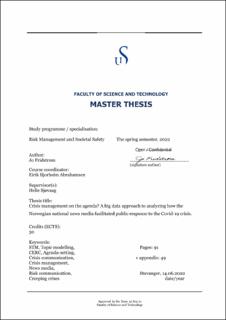| dc.description.abstract | In public health crises, people need information to help them make decisions about how to
protect themselves and others from risk. Successful crisis response is thus dependent on the
dissemination of efficacious information. As online news is where most people get the
majority of their information, providing it during a crisis is a task for journalists and the news
media. However, there are gaps in the knowledge about how the news media fills their role in
communicating health information during public health crises. With this thesis, I sought to
help lessen the gap of knowledge about how the news media facilitate crisis response by
analyzing what they communicated and how communication changed over different stages of
the Covid-19 crisis in Norway.
I apply a generative machine learning approach, topic modeling, to analyze more than
twenty-two thousand online news articles published by two of Norway's most prominent
national newspapers, VG and Aftenposten. The model uses Bayesian statistics to categorize
text based on similar words appearing together and their likelihood of appearing with other
words. The method allows researchers to discover latent topics and patterns within extensive
data, producing comparable results to human coders at a scale that lends itself particularly
well to give detailed descriptions of news media communication efforts.
Using the topic model results, I propose and test a method for operationalizing and
analyzing how risk and crisis communication changes in news media content over time. I
identified topics reflective of the coverage of the crisis according to their conduciveness to
sensemaking and self-efficacy in the Norwegian public — building on theory on crisis and
emergency risk communication (CERC). The concept of the creeping crisis provided a
theoretical basis for differentiating the Covid-19 crisis from other crises. Furthermore,
agenda-setting provided an additional theoretical lens to help better understand the
effectiveness of this communication on behavioral change and response. The applied method
was found to be fruitful in giving insight into how the selected news organizations covered the
Covid-19 crisis in Norway.
I identified 200 different topics covered by VG and Aftenposten during the first stages of
the Coronavirus crisis. 75 of these topics focused on the crisis itself. Subsequent topics
identified staple news topics such as sports teams, culture and movies, social issues, and
more. 48 topics were identified as conducive to crisis management, and these were analyzed
based on their prevalence over different stages of the crisis. The findings suggest that
Norwegian news media disseminated information facilitating crisis response throughout the
first 15 months of the pandemic, starting from the pre-crisis stage to the initial crisis stage and
into the maintenance stage of the pandemic. Communication changed dramatically between
stages. All in all, these topics reflected 12.5 % of all news coverage published by the two
newspapers. The results indicate that this coverage largely reflected assumptions about
changing communication needs during a crisis, but topics also reflect additional risk
communication efforts resulting from the extended timeframe of the Covid-19 crisis. | |
